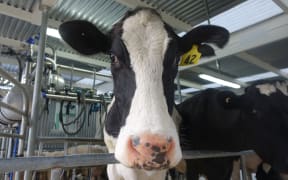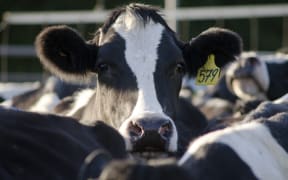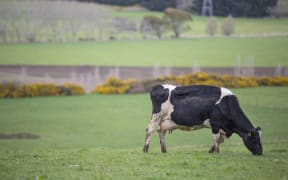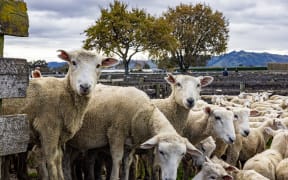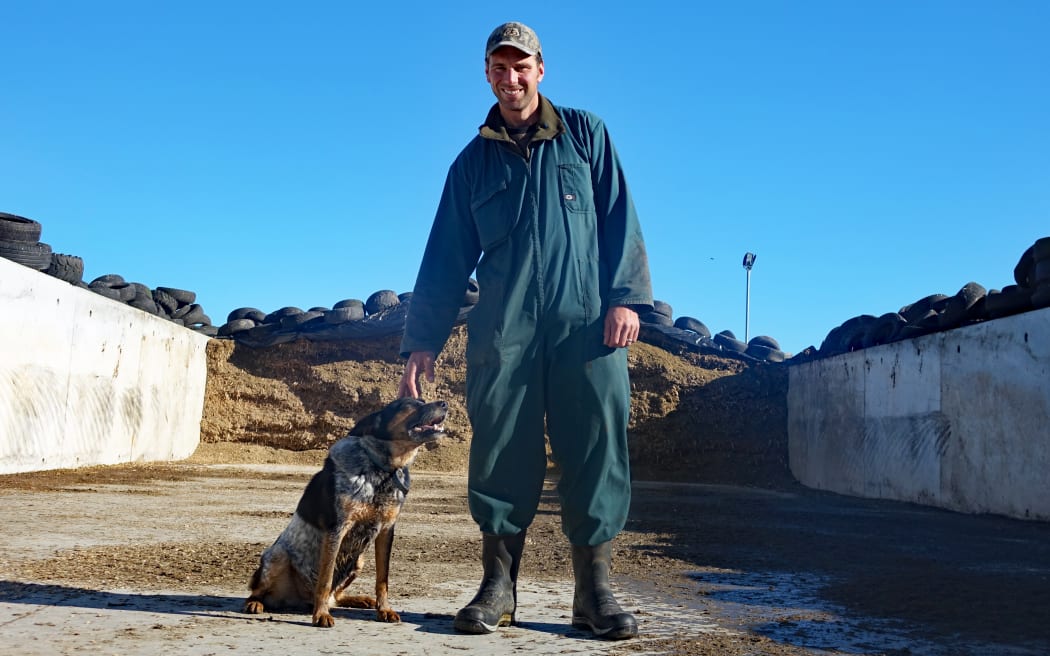
Pihama farmer Jacques Le Prou. Photo: RNZ / Robin Martin
Disheartening. Going to work to lose money. And worried the bank will come knocking.
Dairy farmers around the country say they will be tightening their belts after international diary prices crashed to their lowest levels in nearly five years overnight.
Those still carrying debt fear for their viability while more established players are going over their budgets with a fine-tooth comb.
Jacques Le Prou, who farms 400 cows with his wife Vanessa on 140 hectares in Pihama, South Taranaki, is worried.
"We'll be really under the pump this year. We've gone through our budgets and we're really going to be pulling everything in. We're not going to be doing any extra spending. We're going to be watching our budgets monthly and hopefully we can survive through each month, month by month really."
Le Prou - who has four primary school aged children - converted two farms into one in the past 10 years.
"Now the farm is really humming along really well, but the interest rates obviously being close to 8 percent and the Global Dairy Trade softening the dairy milk payout is dropping, and we are going to be in tight times."
The price of whole milk powder - which strongly affected the payout for local farmers - fell almost 11 percent at the Global Dairy Trade auction overnight amid softening demand from China.
It was the lowest level in nearly five years.
Earlier this month, Fonterra slashed its forecast payout for the 2023/24 season to $6.25 per kilogram of milk solids from $7.75 with a midpoint of $7.
Katrina Pearson, who milked about 450 cows on her 190-hectare family farm near Whangārei in Northland, said it was taking a hit.
"If you put it at a dollar a kilo, that's close to $200,000 out of the farm's budget, and then you put it on all of the other inflated prices for farm operating costs, it does become quite a challenging scenario for the farm to remain viable."
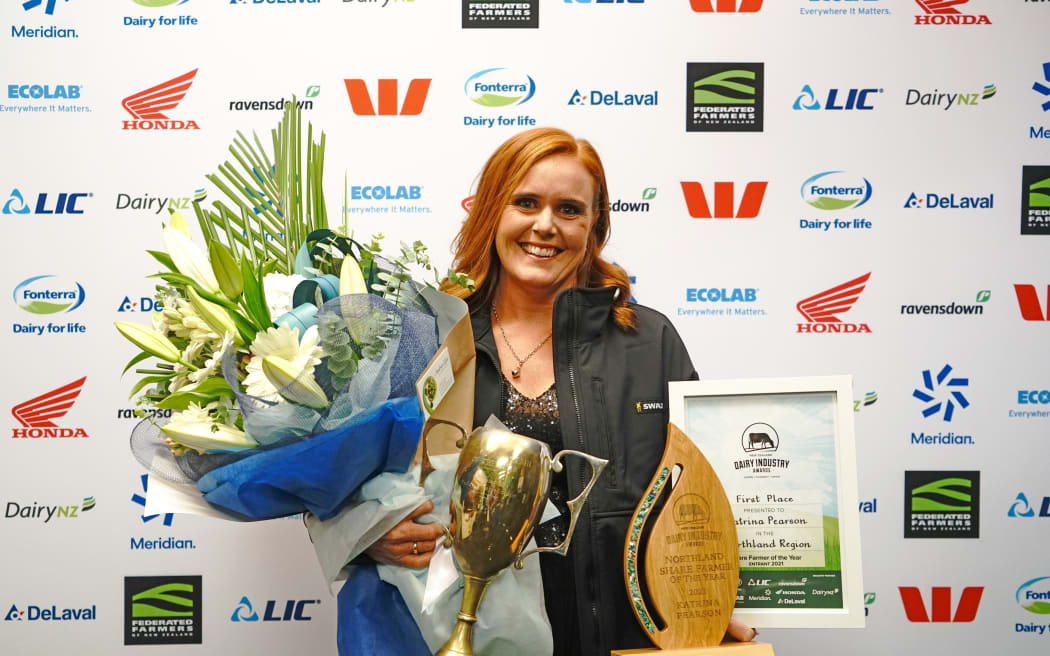
Katrina Pearson was named winner of the 2021 Northland Share Farmer of the Year. Photo: Supplied / NZ Dairy Industry Awards
She would not be breaking even this season.
"We've sort of done some back of an envelope equations for this system and, yeah, we've going to make a loss this year, so it's pretty disheartening, you know, you're going to work to lose money, but whether you do that for a season or two or do you continue for five seasons and then at that point the bank might come knocking, I don't really know."
Pearson said things could be even worse for farmers who had recently bought into the sector.
Charles Whitehead farms about 780 cows on 320 hectares near Methven in Canterbury.
The latest global dairy auction sent a chilling message about New Zealand's reliance on the Chinese market, Whitehead said.
"It's crept right up to 30 or what is it 34 percent of what Fonterra sells China, but when there is a sneeze in China or China doesn't enter the market, all of a sudden we haven't got enough market that can take up that slack."
There would now be a scramble on to find new buyers for New Zealand's milk powder, Whitehead said.
Meanwhile, Le Prou was determined to keep an optimistic outlook.
"We've been through this before, and although it's tough, you do come out the other side and you've still got to have some fun along the way as well. So like, there's lots of things you can do for fun that's free.
"We surf. The waves are free, you know, so for a couple of hundred dollars for a surfboard our whole family can have fun."
Experts said the downward price trend for dairy products could continue and farmers were being urged to keep in close contact with their banks.
'A big hit on the dairy industry,' minister says
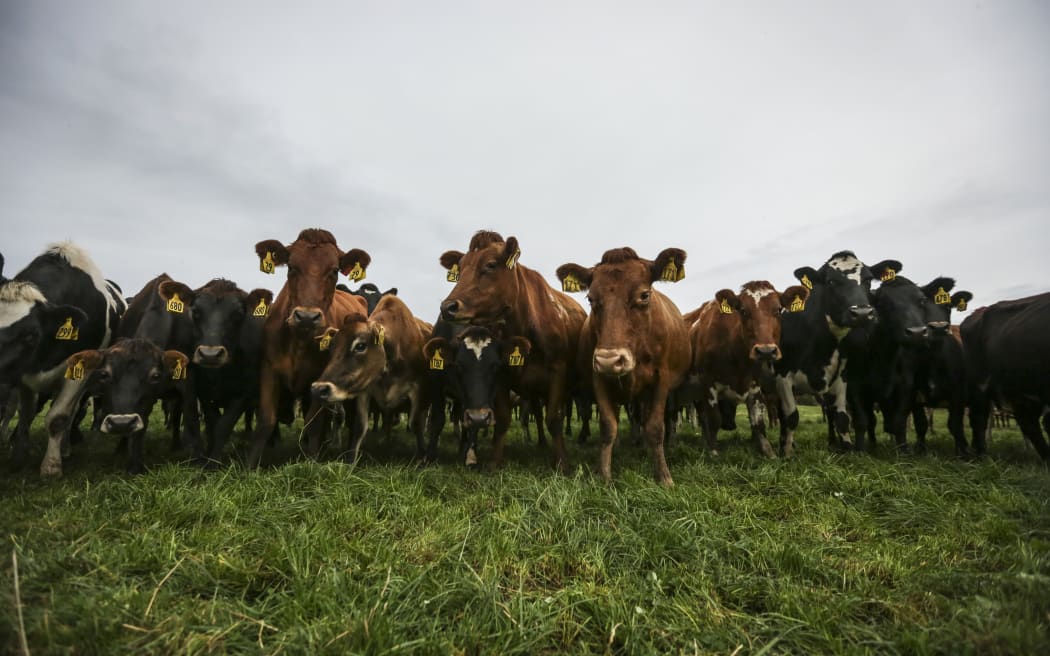
(File image) Photo: RNZ / Rebekah Parsons-King
Agriculture Minister Damien O'Connor said he expected the loss from the drop in GDT prices to be in the hundreds of millions of dollars.
"It's a big hit on the dairy industry, our single biggest industry, the biggest export earner and it drives economic growth and the wellbeing of our rural communities," O'Connor told Checkpoint.
"So it's bad news all around but as was said, these are cycles particularly frequent in commodities and things will pick up again and it is going to be hard for many," he said.
Federated Farmers dairy industry group chair Richard McIntyre said DairyNZ had estimated Fonterra's $1 drop in forecast would cause a $5 billion loss.
"There's a lot of tired farmers who are at the moment trying to work out how they're going to cashflow through the next year and make up for the big deficit that's been left by the expected milk price slash."
On average, that would translate to about $200,000 out of each dairy farming business which would have widespread impacts on rural communities, he said.
"There'll be a lot of rural communities that are suffering, as you know, money spent in communities goes around five, six times so even for people that aren't directly associated with agriculture, within that community, they will still see a bit of a downturn.
"The farming businesses that will be hit the most will be the ones that expanded recently and have a lower equity level and obviously higher levels of debt which have been significantly affected by these interest rate changes we've had."
O'Connor said some banks would be looking to ease the pressure on farmers through various ways, but he acknowledged not all were playing nice.
"The banks are business partners with all the farmers and there's huge amounts of capital involved with in most farming operations.
"The banks have been making very healthy profits, even while there have been some pressures and strains on farmers and the farming systems. The banks have to take some responsibility to help farmers through these difficult times so they can see the way forward.
"They should be fair to people who through no fault of their own are seeing downward trend in the global dairy prices. Some of them might have been prepared for it, a lot of them might not have [been prepared]."
He was also hoping that in the end Fonterra would be able to deliver more for farmers after it slashed the forecast payout.
McIntyre also hoped banks would be fair to dairy farmers and view these circumstances as a "blip".
"Like I said, [there are] high interest rates, falling commodity prices, and high farm working expenses all in one, so they shouldn't just be judging a business on this year's financial performance, they should look at what it's viability would be in normal circumstances.
"We're only a year, maybe two, away from having reasonable interest rates again and commodity prices will rise again as well, and so if farmers can get through to that [time] then hopefully they'll be supported by their banks and will not have to sell."

Agriculture Minister Damien O'Connor says the UK and EU Free Trade Agreements provide new opportunities for the industry to explore new markets. Photo: RNZ / Dom Thomas
The industry was still too reliant on China but the drop in GDT prices was the "inevitable consequences" of a slower recovery after Covid-19 for China, O'Connor said.
"As a small business owner, if you've got over 30 percent of your income reliant on one customer then it's always somewhat fragile and exposed position to be in. We've been saying that to industry.
"I mean China's been and will continue to be a very strong market for us ... they've got supplies stored that they will want to use up before they buy more in the market."
While McIntyre said it would good to have other reliable markets for when China's demand drops, the question was whether to sell according to who paid the most or to spread the risk.
"We know they built up a lot of inventory during Covid in order to ensure they had a whole lot of food on hand to be able to feed their people with potential lockdowns et cetera, and now they're potentially running down that inventory a little bit and demand is soft as a result."
The minister said the UK and EU Free Trade Agreements (FTAs) provided new opportunities for the industry to explore new markets.
"We have been saying to the industry and to all those exporters they need to get out and look for other opportunities.
"In dairy, we produce about 2.5 percent of total world production, we are the single biggest trader but that means there are lots of markets around the world looking for where there are gaps that we can fill the inadequate supply I guess from seasonal change or whatever other disruptions have occurred."
However, McIntyre said the FTAs were not "super" for the dairy industry, but it would still increase products being sold through those markets, and there were other opportunities beyond them.
"We do sell a lot of product into South America, Central America, and the Middle East as well, and we can always look at expanding those."
The minister's message to farmers with low morale was to talk to others who have been through this before.
"MPI have advisers out on the ground now to help connect to farmers who might not be part of networks, to provide some alternatives, whether it be changing their farming system or cutting back their costs, or just looking at ways of getting through the tough times.
"Often when things are tough, people don't see the woods for the trees, and we have to assist them through these periods."
Constant challenges over the past few years, including supply chain problems during the pandemic, interest rates, and extreme weather events, had made dairy farming more difficult.
"I guess it's hard to go out and continue to do it sometimes, but at the end of the day, the reason we're farmers is we love the outdoors, we love our animals and we love the freedom and autonomy it gives us, that's why we keep getting up in the morning and going out in the rain."
